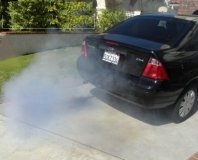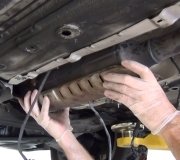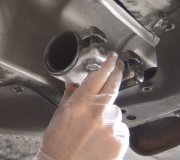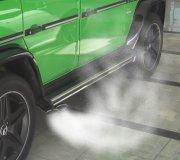Hi, blue smoke is caused by engine oil entering the cylinder area and being burned along with the fuel air mixture. Just a small drop of oil leaking into the cylinder can produce blue smoke out the tailpipe. Blue smoke is more likely in older or higher mileage vehicles than newer cars with fewer miles.
How did the engine oil get inside the cylinder in the first place? The car has many seals, gaskets, and O-rings that are designed to keep the engine oil from entering the cylinder, and one of them has failed. If too much oil leaks into the cylinder and fouls the spark plug, it will cause a misfire (engine miss) in that cylinder, and the spark plug will have to be replaced or cleaned of the oil. Using thicker weight engine oil or an oil additive designed to reduce oil leaks might help reduce the amount of oil leaking into the cylinder.
Since you have 130000 miles on the car, I believe it is your valve guide seals, I have attached a pic. As the engine oil splashes around inside the valve cover it drains back down into the engine. The valve seals are like little umbrellas over the valves. As the oil hits them, the oil runs off the umbrella or seal to go back into the engine. The seals, being rubber get hard, brittle, some parts break off. Then then oil runs down the valve into the cylinder. Thus when you accelerate the oil is burned and out the tail pipe, the blue smoke you see. Sometimes it is worse first thing when you start the car after sitting a while. That is because more oil has leaked into the cylinder while sitting.
A valve job could cost you between $1200-$1800. If you do it yourself obviously less. Most of this is labor. Some do a temp fix by replacing just the seal without taking the heads off. You must be careful here so you don't drop the valve inside the cylinder though. It is really better to do a comlete head job though. If you decide to do a valve job make sure all valves are checked, replaced if bad, the good ones ground. Have the heads resurfaced also. You can buy head gasket kits that have all of the gaskets you need for a head removal. What I do is remove the heads and bring them and the gasket set to the machinist. He takes the parts he needs (those seals) and he totally reworks the heads.
As for the importance. . .up to you. It will only get worse over time. Also, you said it was a 4 cylinder. I show those models are only 6 cylinders.
Hope that helps. . ...good luck and be safe.

Wednesday, October 8th, 2008 AT 6:58 PM




